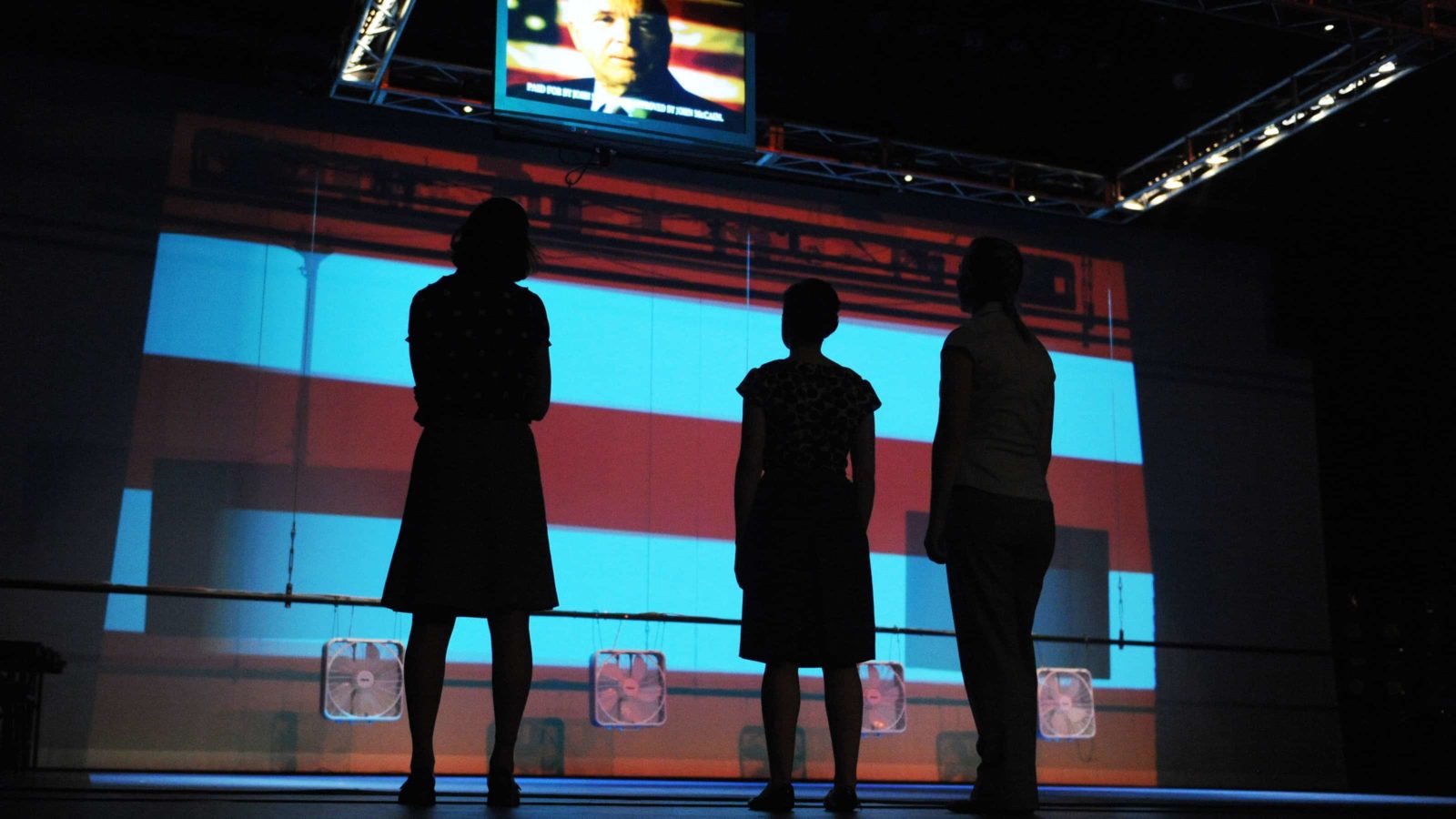Gentle music greets you as you enter the virtual space. Slowly, the sounds of everyday life begin to merge and crescendo—the sound of typing, some quiet chatter, a text alert, somewhere a dog barking. Then questions begin to flood the chat — “Who is the first president you voted for?” “Have you ever been to a protest?” “What makes an idea radical?” — and slowly, from screens across the country, people begin to answer as a community takes shape in the void. In the midst of polarization and isolation, people begin to craft togetherness out of authenticity.
“When’s the last time someone’s asked you a question and really wanted to know the answer?” asks Mak Wagner, a theatre major and one of the actors in MCLA’s performance of Sojourn Theatre’s The Race 2020, an interactive and experimental play that explores the uniquely high stakes surrounding the 2020 election.”I guess that’s what I love about theater. It’s community everywhere you go.”
This weekend, on November 6, 7 and 8, MCLA’s Theatre Program will perform The Race 2020 virtually, offering a space for reflection, civic discourse, and connection. The show opened last weekend and intentionally offers a series of performances directly before and after this year’s presidential election to process and engage with the events of this week. The first weekend of performances wrestled with the uncertainty of the election, and the second weekend of performances will give an opportunity to grapple with those outcomes.
“This is theater as a tool for civic discourse,” said Jeremy Winchester, theater professor at MCLA and a co-director of the production, “Plays can be an opportunity for communities to come together and dialogue about the things that we face.”
In MCLA’s fully virtual production, eight actors who represent a wide range of diverse thoughts, backgrounds, and identities discuss their fears and hopes for the election while focusing on the major events of this year, particularly the Black Lives Matter movement.
“We get to actually be ourselves,” said Wagner. “We got to craft it ourselves and edit it ourselves so some of the lines are literally us speaking to the audience.”
Wagner feels this authenticity is central to the show. Since the audience participation changes every night and the actors never know which questions they’ll be asked, their answers are always authentic and unrehearsed.
‘I’m interested in theater as a space for strangers to encounter each other . . . If you can make a space for democracy, for plurality, for public imagination that can hold different points of view, then that’s the theater I’m most interested in.’ – Michael Rohd
Winchester feels that the performance is valuable as a way for the actors to express their political views and experiences.
“The students that are involved in the show, the students that are asking the questions, have something to say to the world,” he said.
Wagner, like the rest of the cast, is passionate about the urgency of the play’s message. “There’s all of this stuff that’s at stake,” they said. “There’s lives at stake and there’s rights at stake, and there’s so much that’s on the edge of being either taken away or implemented in ways that would be harmful to all of us or to particular minorities.”
For Wagner, the play has also provided a source of community in this strange time. They see theater as a way to come together and connect with others across virtual space. Wagner said they felt extremely moved by the audience participants in the first few nights of shows.
“It’s really surreal to see them want to participate,” Wagner explained. “You’re seeing all of these people share their hopes and their fears and their dreams.”
The show involves dialogue, monologues, dance numbers, humorous inspirational speeches, and an interview-style question-and-answer section in which the actors pose questions about leadership to each other and to the audience. The show also invites guests likes the president of MCLA, a city councilor, and, this weekend, Mayor Tom Bernard of North Adams—people who hold positions of leadership in the community—and the actors pose questions to them about leadership.
Sojourn theatre originally created the play in 2008 through a residency at Georgetown University in conjunction with the 2008 election of Barack Obama, and they have performed it every four years since then for each election cycle.
Michael Rohd, the founder and artistic director of Sojourn Theater and the writer of The Race, was interested in creating a piece that explored the question of what people in the U.S. look for in a leader. When Georgetown University approached him to ask about a collaboration, he said, he decided to use that historically significant moment of political transition as an opportunity to open up conversations about leadership in the United States.
“I’m interested in theater as a space for strangers to encounter each other,” he said. “If you can make an event where strangers come to know strangers, and if you can do it in a way where they actually express deeply held beliefs, or perspectives that are maybe surprising or challenging to someone they had never met before, and those two people can go through that experience and come out of it not having yelled or felt furious — maybe they disagreed, maybe they argued, maybe they felt angry, but they survived it — If you can make a space for democracy, for plurality, for public imagination that can hold different points of view, then that’s the theater I’m most interested in.”
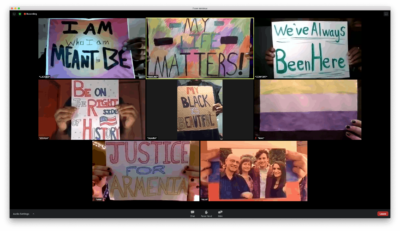
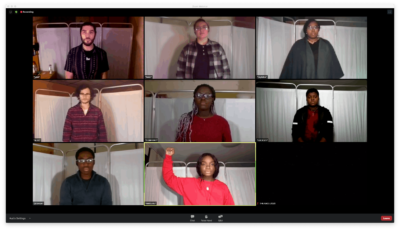
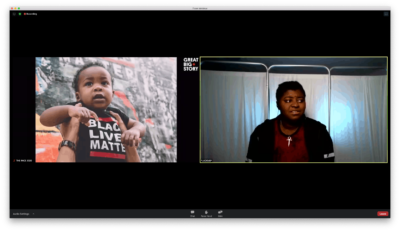
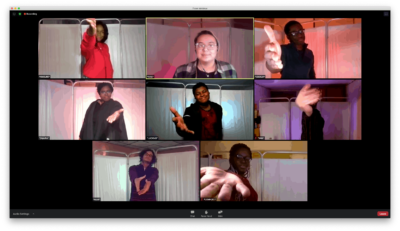
Sojourn theater often creates projects with interactivity and participation to address civic content. The award-winning ensemble has toured nationally and internationally since 1999, as 17 actors in seven cities have created new work in partnership with planning commissions, public health, public transportation, care for elders and more.
They created ‘The Race’ in 2008 in an intensely collaborative process, Rohd said. The ensemble worked together to generate the material for the show. They assembled questions, sourcing them from all over the country, through emails, surveys and workshops with high schools and community groups, as well as conversations with strangers on bus rides across D.C., in order to generate a list of more than 1000 questions about leadership.
In August of 2019, in anticipation of the upcoming 2020 election, Rohd announced that The Race 2020 would be available, royalty-free, to any group across the country that wanted to produce it. MCLA is one of many groups producing the show this year, including professional companies such as Intiman Theatre in Seattle and Matrix Theater in Detroit, as well as many collegiate programs such as Cornell, Columbia, and Virginia Tech.
Earlier this year, Rohd held a series of online convenings with all the producers in order to support them, but was intentionally not involved in making creative decisions. Each group has had the artistic freedom to alter the show in significant ways, and Rohd said he has been excited to see the many different forms of the project evolving across the country.
Because of the nature of the show, MCLA has tailored the script to their specific group of actors. The eight student performers were highly involved in creating the material that they perform because each character is, in effect, an emphasized version of themselves.
“The majority of what the audience sees is the actors not really acting at all,” Winchester explained, “rather they are speaking words that they spoke in the process, presented in this particularly theatricalized context. They are being themselves while performing the show.”
‘I remain compelled to believe that the arts offer a very unique space in this time for that kind of experience, and I certainly believe we need it now more desperately than we ever, ever have.’ – Michael Rohd
Winchester is extremely thankful for the actors’ vulnerability throughout the process.
“Asking the performers to bare their hearts and souls in the way that this particular play does, particularly in this zoom environment,” he said, “… we just asked an unreasonable thing, and yet they did it and did so beautifully. There were lots of moments when in the rehearsal process, I was breath taken by how honest, and open, and vulnerable these actors were on matters that dealt with their literal life and death. . . . the whole experience felt to me like a gift that I didn’t even a little bit deserve.”
Wagner has also loved working with the cast and directors.
“(They are) a bunch of amazing, wonderful people whom I love, very much, and most of them I haven’t even met in real life,” they said. “You can just tell that we’re all people who really love theater and who believe that theater is this amazing experience that gives us a sense of self. . . . Something that we never want to turn our back on because this is who we are.”
As the cast faces the outcome of this much-anticipated election, the show will likely change in the second weekend of performances, shifting from uncertainty to reflection. In Rohd’s original production of The Race in 2008, and again in 2016, the show also took place on either side of the election, and he found it powerful to see the ways in which the conversation and the energy changed.
He said that after Obama won in 2008, “those performances got celebratory, they got emotional, and that was so beautiful to be a part of.”
When they remounted the show in 2016, they did a marathon event through the election.
“I was in a theater with hundreds of strangers at the moment that they called the election for Trump, and that was super intense,” Rohd said.
Whatever the outcome of this election, he feels that this show provides a crucial space to process and work through those consequences.
“We’re going to have to listen and learn and deal with our own feelings of anger or frustration or relief,” he said. “Whichever way it goes, there’s a tremendous amount of work ahead. If Joe Biden wins, the anger and vitriol on the right is going to be very intense, and if Donald Trump wins, the disappointment and anger and frustration and despair on the left is going to be very present. … Regardless there’s going to be a lot of stuff to clean up and move forward on as communities and as artists.”
For Rohd, this show is “civic space masquerading as theater,” and he feels that this kind of work is indispensable in a time when civil discourse, around the country, is failing.
“There are many examples of people and institutions around the country trying to strengthen our civic fabric,” he reflects, “but there’s much more evidence of the failure of our country to maintain civil and civic fabric. I remain compelled to believe that the arts offer a very unique space in this time for that kind of experience, and I certainly believe we need it now more desperately than we ever, ever have.”

